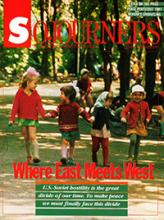There is something mystical about the empowerment of formerly powerless people. Individuals who have carried centuries of oppression on their backs, who have resigned themselves to accept the seemingly inevitable realities of suffering, injustice, and marginalization, and who have come to believe they can do nothing to change their situation, are suddenly and permanently transformed.
The vehicle for their transformation may be as sweeping as a political revolution. Or it may be as simple as the first, small plot of land that belongs to them alone, or the first child in an extended family to go to college. It may even be as personal, and almost imperceptible, as a still, small voice. Whatever the conversion event or experience is, it changes not only one's place in the world, but also one's way of looking at the world.
It is an unexpected happening or achievement that says to the individual: "Things don't always have to be this way. Things can change. You do have some capacity to affect and change your situation and perhaps even that of others. There is hope." The transformation wrought by these realizations is radical; the person who once thought nothing could be done now believes almost anything is possible. People who once could offer little resistance now represent a force to be reckoned with.
That is why, in these days of continuing, and almost continual, tension and turmoil in the Philippines, it is important to remember the events of one year ago. Reflecting on this anniversary, it may well be that the most important event of those "four days in February" was not the deposition of a dictator or the installation of a new government, but the participation--the empowerment--of Filipino people. Because of those events, millions of Filipinos were changed, and, as a result, the formula of Philippine politics has been altered.
Read the Full Article

